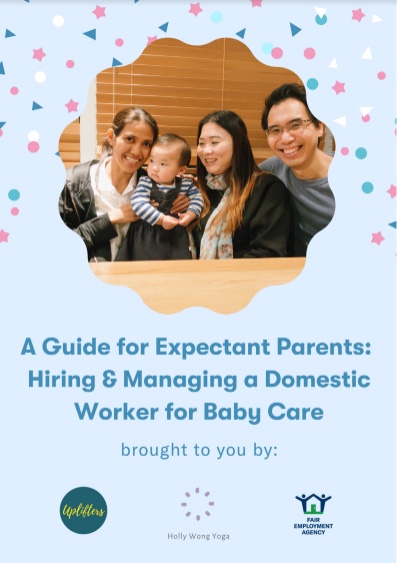Get better at job interviews and find the best employer for you!
8 things to know before
- Ask for advice on good ethical agencies, try free platforms like Helper Choice, HelperPlace, or direct hire so you don’t have to pay fees. Always check if the agency is licensed and how much they will charge you (it is maximum 10% of your monthly salary in Hong Kong and 2 months salary in Singapore)
- Start interviewing two months before the end of your contract or as soon as possible so you have enough time for job interviews and don’t feel pressured.
- Look at the job offer. Only accept job interviews if you really consider the offer and if your profile meets the employer’s requirements. Don’t waste your time and employer’s time if you already know that you or they will say no.
- Go to all job interviews with employers that you are happy to consider. Don’t wait for an answer before accepting another interview. Employers do the same with domestic workers, so you don’t have to feel uncomfortable. Don’t hesitate to register in an agency (with no fee for domestic workers) even if you may find trough direct hire. You don’t have to feel bad for the agent.
- Let friends know where you go for job interviews (give address and interview time) so they can react in case of an emergency. Send them a message afterwards, so they know you are safe. Don’t go to an interview in a private place if you feel the employer is strange. If you want to come with a friend, don’t let the employers know about it. She should wait for you outside.
- Be on time, search on Google maps before for directions and allow 15 minutes extra buffer time in case you get lost. If you need to cancel, try to do it at least 24 hours in advance.
- If you are running late, don’t cancel, send a message or call “I am really sorry I am running late. I will be there in … minutes. If that’s not possible for you, can we please reschedule? Many thanks and all my apologies again.”
- Prepare your answers to questions employers generally ask to domestic workers (see below) and come with copies of your referral letters and certificates if you have some.
Know how to answer these questions
- Experience – Describe a day with your current employer. What is your schedule? What do you like/dislike? Do you think your work is too easy or too hard? How many employers have you had and how long have you worked for them? Can I contact them? Do you have referral letters? Why are you looking to change employer or not renewing your current contract? If it is your employer’s decision, explain why.
- Cooking – What kind of food do you know how to cook? (Western, Chinese, Indian, Indonesian, vegetarian …?) Did your employers ask you to follow recipes before and how (in a cookbook, on YouTube?). What are your favourite recipes? Can you explain 1 recipe now?
- Children / Elderly people. What experience do you have (how many years taking care of children / elderly people). What qualifications and certificates do you have? Did you attend any specific training/classes here or in your country of origin? Do you know first aid?
- Children. How old were the children you took care of? Did you already take care of a baby? If my child falls on his head and then seems sleepy, what would you do? If my child is talking to you in a rude way and doesn’t accept your orders, what would you do?
- Elderly people. How old where the elderly people you took care of before? What did you have to do to help them? What would you do I my old mother falls and does not reply to you?
- What are you better at? Household chores, children, elderly people, cooking? What do you like best?
- Salary – What is your current salary? What do you want? If it is above minimum salary, what makes you think you are worth more?
- Are there other things you could do for us (sewing/baking bread …)?
- Are you autonomous, willing to take initiatives or do you prefer to be told exactly what you should do hour by hour? How would you describe yourself or how would your friends describe you?
- What are your interests and hobbies? What do you during your days off?
- Why do you work as a domestic worker? How long do you plan to work abroad?
3 rules during job interviews
- Tell the truth. For example, don’t say you can cook if you can’t. Your employer will quickly find out and be disappointed. If you think you cannot do what they ask, just let them know. There will be many other employers who may be looking for you.
- Ask questions about the family and the job. The job interview is not only for the employer to know if they want to hire you but also for you to decide if you want to work for them. Ask questions about what they expect of their domestic worker, how old are the children… Don’t ask immediate questions about the salary and days off, employers will think you are only after the money and an easy job. It’s better to let them tell you first about the salary or only ask about it after they made you an offer. However, it’s fine to ask where you would sleep, food arrangements if you are allowed to practice your religion if you want to pray during the day and/or fast.
- Don’t give in to pressure. Take time to decide, don’t say yes during the job interview. Once employers have made you an offer, it’s time to ask all your remaining questions. You need to have a clear idea of the job duties and the working conditions if they haven’t told you about it already (salary, approximate schedule, days off and national holidays…) Don’t hesitate to negotiate the salary if you have experience and don’t accept a lower salary than your actual one unless specific circumstances (very high actual salary, no more time…).
Making your decision
- Don’t say yes and sign a contract to say no afterwards because you find an employer you like better. Wait for answers from all the employers you liked, then say yes to the best one for you.
- Write down all you remember from the job interview, so you can easily compare job offers in the future. If you go to many job interviews, you may forget who said what otherwise.
- Consider the duties and the salary but even more importantly the working conditions and the employer’s attitude: are they respectful? Do they seem kind people?
- If you are waiting for another employer’s decision, reply politely: “Many thanks for your kind offer. I am happy that you liked my profile. I want to take a little bit of time before deciding, but I will quickly let you know my answer. I know you can’t wait long.”
- Once you’ve made your decision, say politely no to other employers who offered you a job: “I want to thank you once again for your offer. I really took the time to think about it. I made my decision and I am sorry to say no. I wish you the best for finding the perfect helper for you.” If they ask you why just say “Your offer was good and I am really grateful but I liked their offer better”. If they insist, say that you already signed the contract.
- Show your happiness to the employer who is hiring you: “I am really happy to accept your offer. I am looking forward to working with your family”.
Good luck with job hunting and share your experience and advice here as well!

